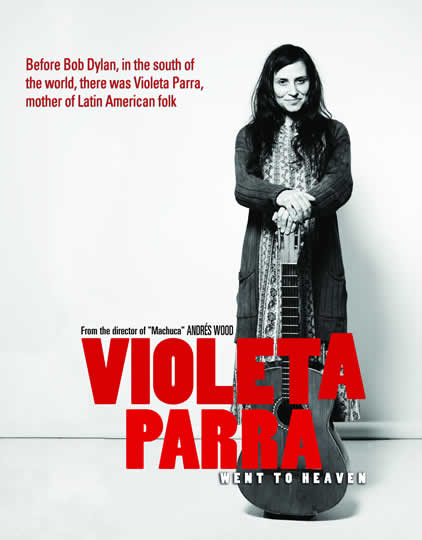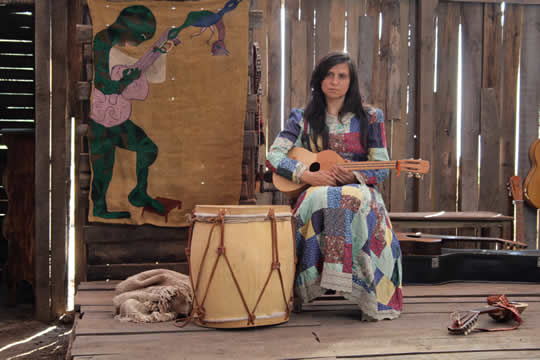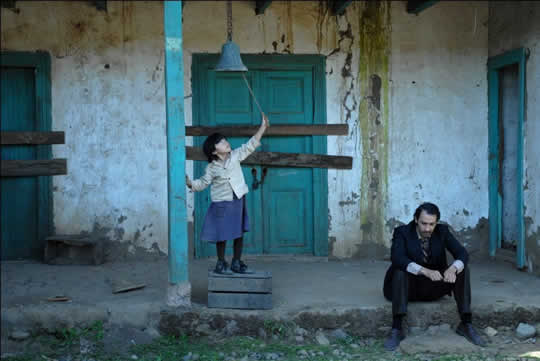Violeta Parra Went to Heaven is about the life of Violeta Para the Chilean singer, author, collector, poet, painter, sculptor, embroiderer, and ceramist. She was a multifaceted artist, a popular culture icon, a treasurer of deepest Chilean traditions, and a woman of intense contradictions, but unique genius.
With more than 3,000 songs and other inspiring works, Violeta Parra won the appreciation of national art and opened the gates for the new Chilean song. She rescued the forgotten traditional culture, traveled through Chile from north to south to meet its voice, uplift it, and save it from stereotypes; then she reinvented it, creating musical masterpieces, and released them to the country and to the world. ―Create from what there is‖ was her slogan.
We talked to Andres Wood , director of Violeta Parra Went to Heaven about making of the film and its chance for nomination at Academy Awards 2012.
Bijan Tehrani: How did you first come up with the idea of making Violet Parra Went to Heaven?
Andres Wood: Violetta Para is a part of our culture in Chile, part of our everyday life in a way. Even though we do not know her deeply but we know her work. I really liked her and her songs, so I started researching about her and I was amazed that there was not a  single feature film made about her life, even though she died 45 years ago. When I found out about Angel Parra’s book about Violeta, it helped me in a way to create the structure and the spirit of the movie, but I already had the motivation to make this film before reading the book.
single feature film made about her life, even though she died 45 years ago. When I found out about Angel Parra’s book about Violeta, it helped me in a way to create the structure and the spirit of the movie, but I already had the motivation to make this film before reading the book.
BT: How faithful were you the Angel Parra’s book?
AW: My film is a very free adaptation of the book, we followed the spirit of the book and therefore the film’s structure moves with a lot of freedom through the different passages of the story; there are differences as the book is Violeta’s son point of view and the movie is don through Violetta’s own point of view.
BT: What it took you to understand Viloleta character?
AW: We did a lot of research, we read everything that was written about her and we studied her songs. she had written a few books and we also studied her visual arts and her tapestry, and after all that studies, we started writing the screenplay. We tried to create a structure and a movie based on her character and based more on her emotions rather than making a realistic biographical film.
BT: Watching Violeta Parra Went to Heaven, I felt that you tried to show the soul of her through portraying selected slices of her real life.
AW: Yes exactly, we tried to portray an artist with our own artistic aspirations; we decided to anchor the movie in that moment of whether you know if you are alive or dead. We found something valuable and efective there and we could tell that we were right through the reaction of audience.
BT: How did you go about casting the main character and how did you work with her?
AW: We did a casting with actresses that had a lot of experience; the process took place a year before we started shooting.Eventually when we found Francisca Gavilán, our star, her talent and the work helped us build the Violeta character the way we had in mind. We did not think that she would sing the parts of Violetta Para, but she had prepared herself for this part so well that she ended up singing all the songs in the movie.
 BT: There are few sequences in film in black & white, are these re-creations or are they actual archival footage?
BT: There are few sequences in film in black & white, are these re-creations or are they actual archival footage?
AW: It is a mixture, because there are very few images and films left from Violetta Para, we used parts of a documentary about her show; and we did our own stuff on the character as well.
BT: How has this film been received in Chile and other film festivals?
AW: Screening of the film in US will mark the international premiere of Violeta. But this film has been shown in Argentina and Chile. In Chile we had only had 17 copies of the film, we wanted 20, but the film had very good box office numbers, and it had the best box office performance of a Chilean films in 7 years. In Argentina the audience reaction was very good as well, we are happy now to be in Sundance because we are crossing the Latin world.
BT: How did you come up with the visual style of the film, did you work closely with the DP of the film, Miguel Ioan Littin or did you have a vision in mind prior to the shoot?
AW: It is a mixture, we were really working as a team, I had done several films with Miguel Ioan Littin and Rodrigo Bazaes , the production designer and our screenplay writer. We usually work towards building a movie and then add adding layers to it. Our team managed to bring the attention on the backgrounds and choosing the style of camera movement, but our way of work in this film was a mixture of preparation and improvisation, there was not a set pattern.
BT: How have people responded to the performance of Francisca Gavilán as Violetta?
AW: For us finding the proper actress to play Violeta was the most important and the most challenging task we had. Specially, picking someone that Chilean audience believes her as Violeta. We needed someone with Villeta’s energy and Francisca Gavilán was a perfect match and she was so close to the memory that we have from Violetta that some people thought that this film is a documentary and other people who had met her in person or worked with her, were very touched and after a while when watching the film they were forgetting that this is an actress playing Violeta . Francisca performance was well received by everyone, even those critics, who did not like the movie much, loved the great job she has done.
BT: You mentioned that Francisca actually sang the songs in the movie, how close was her voice to Violetta’s voice?
AW: It wasn’t quite similar, again our film is in the spirit of her, we did not want to recreate her exactly, rather we wanted to create our own vision of Violeta. I had never met her myself, so I did not know her in person, and this fact, actually gave us the chance of getting closer to her soul than just creating a Violeta’s lookalike.
BT: How do you see your chances of being nominated for the Best Foreign language Film Award in 2012 Oscars?
AW: It is always difficult to get nomination and you need a lot of luck. But considering the type of character we have as the center of our film and incredible and touching performance of Francisca Gavilán and all that coupled with the amazing reception of the film by audience, I think that we have a chance. We might not have a big budget to promote the film, but I think that we have a chance.
BT: How much do you think your possible nomination would help you with your future projects?
AW: I am sure that it with help the Chilean film industry, and it will help this film, we want the film to seen as much as it can, because we are very proud of it and Violetta Para is a part of our cultural past and is essential to the Chilean culture as well as the Latin American culture.
BT: Do you have any projects lined up?
AW: I always try to do something different than what I have done in my previous film, Violeta Parra Went to Heaven was a new step for me as a director, and therefore I am waiting to see what is expecting me next.

